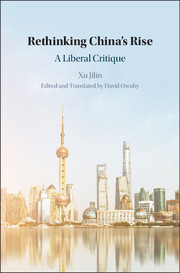Book contents
- Rethinking China’s Rise
- The Cambridge China Library
- Rethinking China’s Rise
- Copyright page
- Contents
- Preface
- Editor and Translator’s Introduction
- 1 What Kind of Civilization? China at a Crossroads
- 2 The Specter of Leviathan: A Critique of Chinese Statism since 2000
- 3 Universal Civilization, or Chinese Values? A Critique of Historicist Thought since 2000
- 4 After the “Great Disembedding”: Family-State, Tianxia, and Self
- 5 What Body for Confucianism’s Lonely Soul?
- 6 The New Tianxia: Rebuilding China’s Internal and External Order
- 7 Two Kinds of Enlightenment: Civilizational Consciousness or Cultural Consciousness
- 8 Li Shenzhi: The Last Scholar-Official, the Last Hero
- Glossary
- Index
Editor and Translator’s Introduction
Published online by Cambridge University Press: 22 June 2018
- Rethinking China’s Rise
- The Cambridge China Library
- Rethinking China’s Rise
- Copyright page
- Contents
- Preface
- Editor and Translator’s Introduction
- 1 What Kind of Civilization? China at a Crossroads
- 2 The Specter of Leviathan: A Critique of Chinese Statism since 2000
- 3 Universal Civilization, or Chinese Values? A Critique of Historicist Thought since 2000
- 4 After the “Great Disembedding”: Family-State, Tianxia, and Self
- 5 What Body for Confucianism’s Lonely Soul?
- 6 The New Tianxia: Rebuilding China’s Internal and External Order
- 7 Two Kinds of Enlightenment: Civilizational Consciousness or Cultural Consciousness
- 8 Li Shenzhi: The Last Scholar-Official, the Last Hero
- Glossary
- Index
Summary
- Type
- Chapter
- Information
- Rethinking China's RiseA Liberal Critique, pp. ix - xxxiiPublisher: Cambridge University PressPrint publication year: 2018



